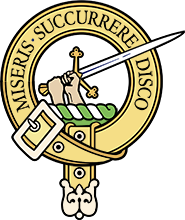MacMillans in Northern Ireland
Cormac mac Aibertaich, the future Bishop of Dunkeld, was probably born and educated in Ireland - and it's quite possible that his son Gilchrist, the progenitor of Clan MacMillan, was too. Since at this time, and throughout the Middle Ages, the sea united rather than divided the Scots living in northern Ireland and the west of Scotland - travel by boat being much easier then than over the mountains and through the forests that covered the land - Maolan's descendants almost certainly settled on both sides of the North Channel. Indeed, it's more than likely that the northern Irish O'Mellans and O'Mullans associated with the O'Cathans - the Irish kindred named for Saint Catan - belonged to the same kindred as the MacMillans, who were a leading branch of the original Scottish Clan Chattan. Thus it is that Dougall Dall mac Ghille-Chattain, who can probably be equated with the Dubgaill mhic Gillacoluim mhic Gillacrist...Gillamaol of the oldest MacMillan genealogy, is said in Clan Chattan tradition to have come from Ireland in 1215 to take possession of the lands of Glen Loy and Loch Arkaig - the latter being the home of Clann 'ic 'illemhaoil Abrach until the great emigration to Canada of 1802.
The Ulster Scots
MacMillans links with northern Ireland were renewed, but changed in nature, in the 17th century when the Scottish government started encouraging the settlement of Protestants in that hitherto predominantly Roman Catholic province. One of the leading Scottish "planters" was Robert McLellan, Lord Kirkcudbright, and many McMillans from his estates in Galloway were among the tenants of his vast new lordships in Ireland. Later in the century - during the "Killing Times" in Galloway, when the restored monarchy attempted to impose an Episcopalian church on an unwilling country - many devout Presbyterians fled across the water to join cousins in northern Ireland. Prominent among them were the "McMillanites" - followers of the Rev. John McMillan of Balmaghie - who in due course became the founder members of the Reformed Presbyterian Church which, as a result, was particularly strong in northern Ireland. Many of these "Covenanters" in Ulster were later to emigrate to North America - initially to the religiously tolerant state created by the Quaker John Penn, but later to South Carolina in particular. When William Buchanan of Auchmar wrote his account of the MacMillans in 1723 he reported that:
"There are a great number also of Macmillans in the parishes of Leud and Armuy in the County of Antrim, and other places of Ireland. The persons of best account of them in that kingdom, is Lieutenant John Macmillan of Killre, in the county of Derry, having an estate of five hundred pound sterling, per annum; also Doctor Macmillan in Lisburn, a person of good repute and circumstances; and Macmillan of Glenseise, and others."
